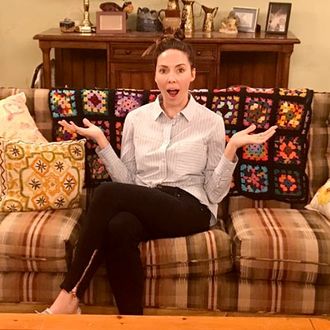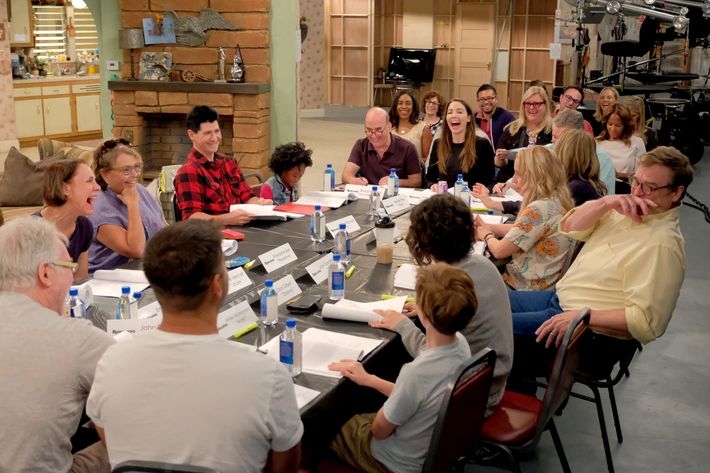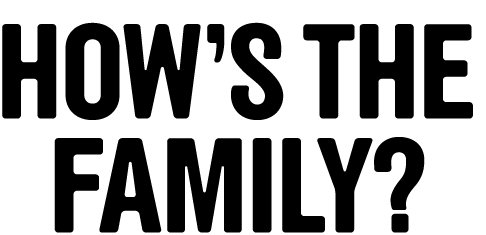
All week long, Vulture is exploring how the family has been represented on our screens. Today, executive producer and co-showrunner of the Roseanne reboot, Whitney Cummings, writes about bringing the show back in 2018. Cummings’ directorial debut, The Female Brain, is out Feb. 9.
I’m not great at tweeting about politics because it takes me too long to emotionally process news before I can come up with a witty, quippy, retweetable tweet. By last summer though, I was finally able to accept the election results and get my brain functioning enough to get back to tweeting in a timely fashion. After a couple of months of unanimously positive feedback, I had a chilling realization: There was a lack of negative comments when I posted anything critical of our current administration. Trolls are abundant online, so why wasn’t anyone lashing out against me, calling me a “libtard,” a “snowflake,” or “lacking common sense”?
It hit me. The exact people I was hoping to reach don’t follow me on social media. Worse, they may not even follow anyone I follow. In fact — gasp — they may not even have social media. I was essentially in an echo chamber, patting myself on the back every time someone who agreed with me, well, agreed with me again. Our country has become so bifurcated, we’re not even exposed to the lives of “the other side” anymore. Like people who exclusively consume Fox News, some of us don’t even know what we don’t know.
Which is why, when I got a call about the revival of Roseanne with the original cast, it was tempting on a number of levels. For one, it was literally my favorite show growing up. It made me grateful for what I had, instead of obsessing over all of the things I wanted but couldn’t afford. Shows like Beverly Hills, 90210 made me feel poor, ugly, and boring, but Roseanne was like oxygen for me. It was about a family who used humor to survive the smash n’ grab we call life, and it inspired me to use levity as my own anesthesia. I thought about the network-TV landscape today, and I realized that it overwhelmingly depicts the “problems” of privileged, financially solvent people. We call shows about the Kardashians, rich housewives, and million-dollar listings “reality” when none of the people on them seem to have ever had to face reality, certainly not a financial one. It made me wonder where working-class people were getting their oxygen, and where they were having their reality seen, understood, and reflected back to them.
When weighing my decision, I remembered a call Michelle Obama had initiated with TV showrunners. I have no idea who was on this call, and I don’t even think I qualify as a showrunner, but she filled us in on some metrics indicating that iconic gay characters on TV shows had a big impact on how people across the country thought about gay marriage. Turns out, many Americans never get to know or even meet people who aren’t like them, so putting them on a flickering box in their living room — full of vulnerabilities, problems, jokes, and dreams — is a great way to develop empathy toward a type of person they may normally not cross paths with. Turns out, fictional characters saying pre-written lines in bespoke costumes on a soundstage can actually make a dent in social change. There are times in comedy when I feel like a self-indulgent child avoiding the real world, but hearing that information made me think that maybe what’s on TV in the next year could influence how this national healing process goes.
Since tweeting wasn’t working, maybe giving my brain to a show that touched the hearts and got the eyeballs of so many working-class people is how I could finally do my part to help us all make sense of the election. Working on Roseanne meant I could write for characters who had different beliefs and experiences than me and who may even have voted differently than me. And I got my wish, that’s for sure. In the writers room, we dug into all of the uncomfortable territory you avoid talking about with your relatives, navigating our fair share of what the “PC police” would label “micro-aggressions,” “trigger words,” and downright FCC violations. We spent a lot of time in the room asking, “Can we say that? Can we get into that?” The answer was usually no, but we usually figured out a way to say it anyway. We even got the help of special-interest and focus groups to make sure we were telling truthful stories that reflect the reality of the working class and our current ideology war. If I reveal what the Roseanne stories are, I think I will actually get arrested, but let me just put it this way: I don’t even know you, but I promise you’re going to be nettled by something on the show. And I think that’s good. If we aren’t disagreeing with someone, that probably means we’ve only surrounded ourselves with people we agree with. Although I’m the first to admit that’s a comfortable place to be, from what I understand about how societies work, it’s also a very dangerous place to be.

It’s not that our goal was specifically to piss anyone off, but the Roseanne writers have a commitment to the truth that I have not seen on other network shows. There’s no agenda, no judgment of the characters, just a deep devotion to the Conners’ fiscal and emotional reality. That, and a bravery around incendiary, progressive-themed stories. Now that I know how making TV works, I’m in such awe of what Roseanne did 20 years ago: a show that includes a plotline about DJ not kissing the black girl at the school play; one where someone had the courage to pitch that Jackie’s boyfriend physically abused her. On a comedy. I now know how big a deal it was to get those stories on the air, much less execute them so gracefully and memorably. In season ten, we approached the show with the same intent: to make you laugh about subjects that usually make us cry.
In network television, there’s a lot of conversation about making characters “likable,” but often it’s at the expense of making them complicated and truthful. After working with some of the show’s original writers, I’ve concluded that their quest to honor reality and avoid worrying about if you “like” the characters is actually what ended up making you love the characters. For a sitcom to make you care that much requires that the writers and actors have a perfect balance of courage and restraint. Whereas on most sitcoms you’re trying to make everything funny, in the Roseanne writers room, you’ll often hear, “Do we even need a joke here?” — which allows for the story to unfold the way life actually would.
And then there is Roseanne herself, never shy to speak her mind and share her personal and political beliefs. I’ve been asked, “How can you work with her? She voted for him.” Although we don’t agree on everything today, Roseanne has always been a personal comedy hero of mine. She broke ground for comics to do and say the things we do and say today. We are in the middle of an incredible resurgence of the women’s movement and encouraging strong female voices to speak out. In the late ’80s, Roseanne was on the front lines of pro-choice and pro-equality, way before it was in the Zeitgeist. Do I co-sign on everything that comes out of her mouth or what she retweets on her Twitter feed today? Of course not. But this clash of ideas and clash of personalities makes for a deeper and more realistic show that could possibly help the people who felt so ignored, dismissed, and invisible that they felt the need to “shake things up.” Maybe Roseanne can help those who felt maligned feel seen and heard, possibly help them trust the mainstream media again, and if nothing else, inspire them to watch another channel besides Fox News for a half-hour.
After the election, Jon Stewart said something really smart, which is obviously no surprise: “There are guys in my neighborhood that I love, that I respect, that I think have incredible qualities, who are not afraid of Mexicans, and not afraid of Muslims, and not afraid of blacks. They’re afraid of their insurance premiums.” This show is not about Trump — it’s about the circumstances that made people think Trump was a good idea.
Everyone asks me what production was like, and the only way I know how to respond is “surreal,” even though we were committed to making sure everything was very, very real. Everyone on the crew worked tirelessly to make sure the show was as authentic as possible to the Conner family. We labored over what everything should feel like 20 years later: what coffee maker they’d have, whether or not they’d have new wallpaper, or if they’d re-covered that iconic couch. The writers worked through the smallest details to make sure the show felt authentic and delivered the same belly laughs, the actors revisited characters they haven’t inhabited for 20 years, the costumer found the perfect plaid shirts, and the set designers spent days painting the set to make sure the living-room wall was the perfect shade of celadon.
My gut tells me the show will make you feel like you’re going home to visit relatives who you may not always align with politically or philosophically, that you may have anger toward, but that you still respect and love because they’re smart, self-aware, and always make you laugh. Maybe since the Conners are not actually your relatives, you can listen long enough to face some of your own prejudices and think, “I guess I never thought of it that way,” or “I don’t agree with what this person believes, but I can now understand why they believe it.” If nothing else, you’ll get to hear that iconic laugh again, which can take you back to 20 years ago when it was a simpler time, back when we believed our news, when we all had no choice but to talk to each other in person, when we didn’t follow our heroes on Twitter, and when you had no idea what celadon was. Maybe you still don’t. It’s a very weird, limey, yellowish mint-green that I don’t want to see anywhere except on the show Roseanne.
*A version of this article appears in the January 22, 2018, issue of New York Magazine.


